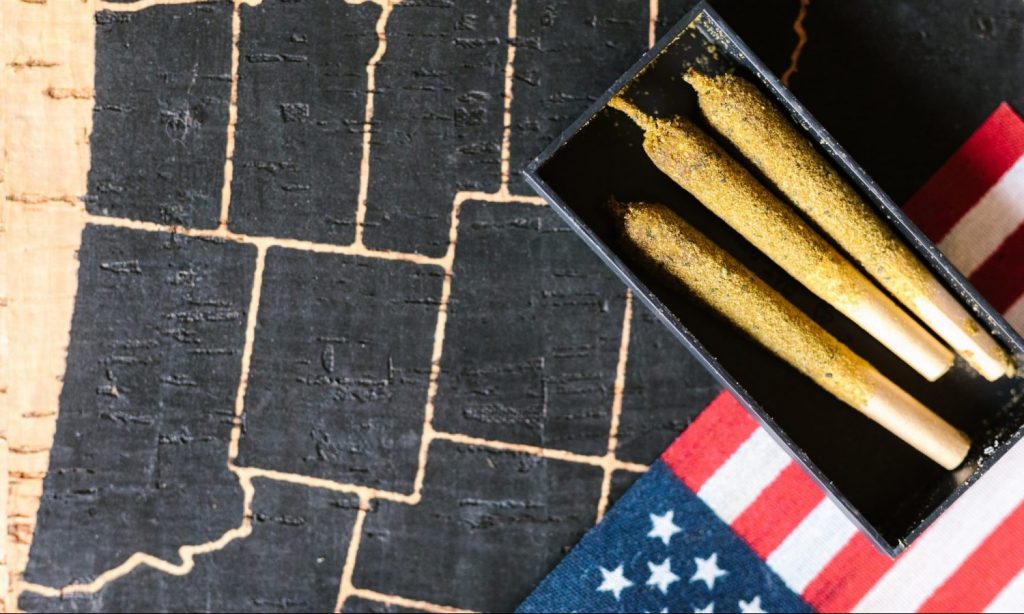
Three big questions after the publication of the Schumer Cannabis Act
They finally did it! Senate Democrats – particularly Majority Leader Schumer and Senators Cory Booker and Ron Wyden – eventually released the much-anticipated cannabis reform bill, previously known only as the Schumer Bill. Its official name, the Cannabis Administration & Opportunity Act or (if you’re a fan of acronyms, the CAOA) is terrible (at best). How do you even pronounce “CAOA”? But what about politics, you ask?
Before we dive into the weeds (get it?), We should take a minute to put the CAOA in the political context. Few, if any, Capitol Hill observers expect the bill to be passed as written. If you’ve read The Leaflet’s coverage of the ongoing cannabis saga on Capitol Hill, you know that the CAOA was destined to be DOA – dead when it arrived. The Biden administration’s lack of response speaks volumes too, as the president does not seem willing to spend his political capital in support of the bill.
So what does the cannabis industry think of the CAOA? It probably won’t go through, but it could be a harbinger of the law finally doing it. And it raises some fascinating questions about the future of cannabis in the United States
Photo by Kevin Dietsch / Getty Images
Will cannabis be interstate and when?
You have probably heard of the “first mover” advantage – the theory that the first company to offer a new service or product gains an advantage over later competitors. But because of the ever-changing nature of the cannabis industry over the past decade, the companies that come first sometimes have a first mover disadvantage.
Because of its federal illegality, the cannabis industry has developed along state (not national) lines. If you have a cannabis dispensary in your city, the products sold there are made from cannabis that is grown and processed in your state. While a winemaker can grow their grapes in California, process their grapes in Nevada, and sell their wine in New York, state and federal laws prevent cannabis companies from doing the same. Therefore, every time an MSO moves into a newly legal cannabis market (like New York or New Jersey), it must build the infrastructure to keep business going in that state. That requires an enormous amount of investment capital.
RELATED: Will Schumer’s Marijuana Legalization Bill Pass Before End Of 2021?
So what happens to all of that investment (and all of the jobs that come with it) when the interstate cannabis trade is suddenly legal? Newcomers to the industry could set up a single grow facility in California (or another state with ideal cannabis growing conditions) and produce enough product to supply pharmacies across the country. (For example, Anheuser-Busch only has 12 breweries that produce all of the Anheuser-Busch beer consumed in the United States.) In other words, extensive international trade in cannabis could render many of the cultivation facilities obsolete.
Which brings us back to the CAOA. Section 111 of the CAOA would prohibit states from banning the interstate transport of cannabis through their borders for lawful delivery to another state (Hello Dormant Commerce Clause). In other words, it gives the interstate cannabis trade the green light and could cause a huge disruption to the industry – unless it is adapted to interstate trade over time.

For this reason, many industry watchers expect this provision to be changed because (i) states with existing state-legal cannabis industries want to protect the jobs created within their borders and (ii) extensive interstate trade would likely be counterproductive to the social justice goals of the CAOA, because smaller ones Operators could be overwhelmed by large, non-governmental competitors.
What does FDA involvement mean for cannabis?
Section 101 of the CAOA would shift responsibility for cannabis and transfer agencies to the FDA. What would FDA involvement mean for the future (and present) of cannabis? The proponents of the CAOA do not offer an unequivocal answer.
The bill is about maintaining state “primacy”, but the FDA has its own standards for approving food and drugs and heavily regulates the manufacture, labeling and sale of the products under its jurisdiction. Industry watchers may recall the chilling effect the FDA’s regulatory process had on a universally accepted robust CBD industry.
In the 2018 Farm Bill, Congress made CBD unscheduled and given farmers the green light to grow and sell hemp and CBD across the country. And while companies were ready to incorporate CBD into everything from Ben & Jerry’s to Coca Cola, the FDA’s excruciatingly long and opaque regulatory process brought the once promising industry to a standstill. Whether the FDA will make the same mistake with cannabis remains to be seen.
Will the federal government listen?
All of this leads to a big meta-question that is more important than any other: Will the federal government listen? In the summary of the CAOA published with the draft law, its sponsors ask for “comments from interest groups and members of the public”.
RELATED: Chuck Schumer’s Long-awaited Federal Marijuana Legalization Bill Revealed: Will Entire Senate Accept It?
But the CAOA raises a number of sensitive issues, many of which require thoughtful political solutions. Will the CAOA proponents (whose hearts seem in the right place) actually accept comments (and not ignore them)? We will see. But let’s hope they do, because that’s the only way to pass a cannabis reform law that balances the liberation of the industry and its suffocation.
(For more information, contact Mitch@dfmklaw.com and Justin@dfmklaw.com.)
This article originally appeared in Feuerstein Kulick’s monthly cannabis newsletter, The Leaflet, to which you can subscribe here. For more information, contact Rich at rich@dfmklaw.com or (201) 410-4737 or email The Leaflet at theleaflet@dfmklaw.com.

Post a comment: